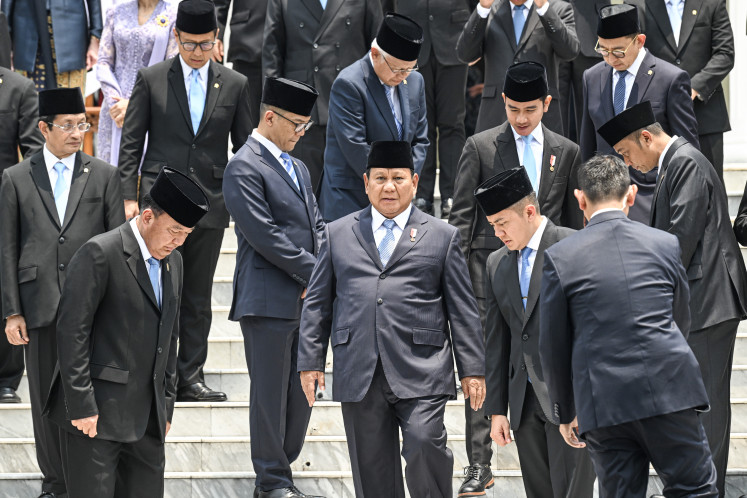Popular Reads
Top Results
Can't find what you're looking for?
View all search resultsPopular Reads
Top Results
Can't find what you're looking for?
View all search resultsIndofood banks on improving customers’ appetite
After seeing a relatively weak performance in 2015, publicly listed consumer goods giant PT Indofood Sukses Makmur (INDF) saw its financial performance improve last year on the back of increasing public spending amid the recovery of commodity prices
Change text size
Gift Premium Articles
to Anyone
A
fter seeing a relatively weak performance in 2015, publicly listed consumer goods giant PT Indofood Sukses Makmur (INDF) saw its financial performance improve last year on the back of increasing public spending amid the recovery of commodity prices.
The company, which produces popular brands, such as Indomie instant noodles, Chitato potato chips and Indomilk dairy products, reported on Friday that its net sales last year increased by 4.2 percent year-on-year (yoy) to Rp 66.75 trillion (US$5 billion), after growing by less than 1 percent the previous year.
Net profit, meanwhile, surged by 39.8 percent yoy to Rp 4.14 trillion, a significant achievement after the figure nosedived by nearly 25 percent in 2015, when Indonesia’s economic growth stood at 4.79 percent, the lowest since 2009.
Southeast Asia’s biggest economy saw its economic growth increase by 5.02 percent last year and expects to book up to 5.3 percent growth this year, largely supported by domestic consumption that is expected to get a boost from recovering commodity prices.
Indofood saw 51 percent of its sales coming from subsidiary food producer PT Indofood CBP Sukses Makmur (ICBP), which mainly relies on the sales of instant noodles, while 22 percent came from wheat flour division Bogasari, 19 percent from agribusiness and 8 percent from the distribution group.
In a separate report, publicly listed ICBP announced that its net revenue grew by 8.5 percent to Rp 34.46 trillion in 2016, with 64 percent of it from instant noodle sales. Net profit, meanwhile, increased by 20 percent to Rp 3.6 trillion.
Indofood expects to book more promising results this year.
“As we moved toward 2017, we remain positive on the outlook of domestic economy and commodity prices, crude palm oil (CPO), in particular” Indofood president director Anthoni Salim said in a press statement.
Indonesia, the world’s largest palm oil producing nation, sees that the sector provides direct employment to millions of people. Improving prices of major commodities, such as CPO and coal, would help boost people’s purchasing power in production regions.
Low inflation has also made it easier for Indofood to reap benefits from increased selling prices, analysts say.
“Price recovery in commodities such as CPO and mineral products has provided more income to the public. They would not mind spending a bit more on food although Indofood has increased their product selling prices,” Koneksi Kapital research head Alfred Nainggolan told The Jakarta Post over the phone.
Inflation stood at 3.02 percent in 2016, lower than 3.35 percent in 2015.
Apart from the commodity price effect, Indofood’s acquisition of several firms in the past has also helped in creating a rebound in its performance, Asjaya Indosurya Securities analyst William Surya Wijaya said.
In 2013, for example, Indofood purchased assets of 22 firms under Tirta Bahagia Group, which owns Club drinking water.
“Such an inorganic expansion has led to better sales and profit,” he said.
Although they predict that commodity price recovery will continue, both analysts agree that it was not enough to help Indofood increase its sales higher than 10 percent this year.
“The contribution from domestic consumption growth isn’t significant enough yet to propel [Indofood] sales unless it targets more markets abroad,” Alfred said.
Previously, Anthoni of Indofood stated that the firm aims to increase export proportion to 30 percent in the long run from 9 percent today. The company also plans to open three or four more instant noodle factories by 2019 to boost production output.










